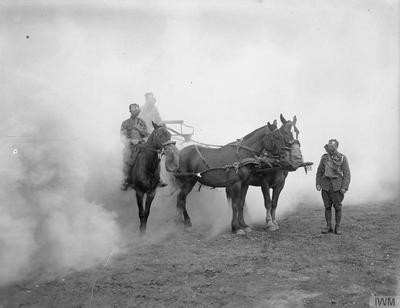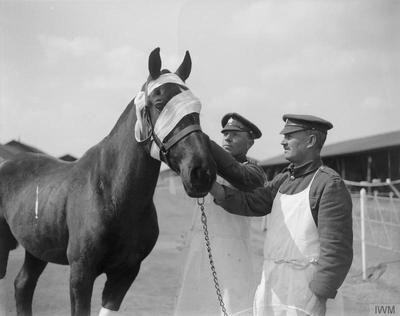Aportando € 5
"Animals in the Great War" - Free access to study material
Book reviews
> 02 Cofinanciadores
Goteo ha construido una historia única en el mundo del micromecenazgo. ¿Quieres seguir formando parte de ella?
Utilizamos cookies propias y de terceros para mejorar su experiencia y nuestros servicios, analizando la navegación en nuestro sitio web. Si continuas navegando, se considera que das tu consentimiento para su uso. Puede obtener más información en nuestra Política de Cookies
Gli animali nella Grande Guerra/Animals in the Great War
 Min.
Min.
 Opt.
Opt.

Book reviews
Research tools with descriptions and commentary of sources
Guidelines to lessons plan
3 hours e-learning theoretical and practical seminar
The eBook launch conference with the participation of scholars and experts
If you are an organization committed to environmental protection and animal rights or a cultural foundation, and you think it's worth supporting this project, support it! Your donation will receive our public gratitude and your logo will be printed on the e-Book's fourth cover.
Animales en la Gran Guerra Un libro electrónico gratuito para investigar la guerra y estudiar su historia desde el punto de vista de los animales que participaron en ella
 Tarea
Tarea
|
Mínimo | Óptimo |
|---|---|---|
|
Professional work - Research
€ 3000 Completion of research in order to realize the eBook
|
€ 3.000 | |
|
Professional work - Editing
€ 2000 are required for the drafting and revision of the Italian text
|
€ 2.000 | |
|
Professional Work - Translation
€ 2500 will cover the cost of translation into English and text revision
|
€ 2.500 |
 Material
Material
|
Mínimo | Óptimo |
|---|---|---|
|
Updates to the first edition of the eBook
An extra budget of € 2500 will enable the annual publication for three years (2019, 2020, 2021) of new specific topics as updates to the first edition of the eBook.
|
€ 2.500 | |
| Total | € 3.000 | € 10.000 |
Este proyecto se concretó en 2016 durante un seminario dedicado a la presencia de animales en el frente. Presentado a una audiencia de 500 estudiantes de secundaria y profesores donde el tema fue recibido con entusiasmo. Los estudiantes experimentaron por primera vez un punto de vista diferente en los estudios de la Primera Guerra Mundial, mientras que los maestros expresaron mucho interés en contar con más herramientas a su disposición para actualizar su enfoque de enseñanza de la historia.
"Los animales en la Gran Guerra" respondería a las necesidades tanto de los docentes como de los estudiantes, proporcionando las primeras referencias actualizadas para el desarrollo de las clases en el aula y el segundo con apoyo metodológico para llevar a cabo el trabajo individual en el hogar. Mirar la Primera Guerra Mundial desde el punto de vista de los animales que participaron en la guerra, gracias también a la diferente sensibilidad que nos permite considerarlos no más como simples mercancías, ofrece algunas ventajas educativas innegables:
emancipar la Gran Guerra de la narrativa de libros de texto, a menudo centrada exclusivamente en los frentes europeos y las derrotas o victorias de naciones individuales;
favorecer la formación interdisciplinar al mezclar distintas áreas geográficas, lingüísticas y disciplinarios porque se anima a los profesores de diferentes disciplinas (historia, literatura y lingüística) a trabajar juntos para desarrollar cursos multidisciplinarios para sus clases;
Proporcionar los medios para desplazar el enfoque a las subjetividades de las temåticas fomentando una ampliación de los horizontes, no sólo del conocimiento de un solo hecho histórico, sino también de una mirada más amplia a los hechos que nos rodean.
"Gli animali nella Grande Guerra"/"Animals in the Great War" will be a bilingual eBook in Italian and English, and available for free download from the Se website.
The eBook will consist of an introductory section dedicated to the general theme and the study tools required for a multidisciplinary teaching approach; and a methodology section dedicated to specific topics such as “the presence of dogs in the war medical service”, “the use of cats in gas detection”, “the employment of pigeons in espionage operations”.
Main sources and suggestions on searching sources on the Web will be provided in the methodology section. A central role will be reserved for the free resources already catalogued in the “Europeana 1914-1918” database, especially photographic resources, which have an immediate impact in attracting students’ attention and could be easily used in developing lessons and aiding individual study. In addition, certain consideration will be given to the wide range of materials listed in “Europeana 1914-1918” although they are not available free of charge.

The idea for this project took shape in 2016 during a seminar dedicated to the presence of animals at the front. Presented to an audience of 500 secondary school students and teachers, the topic was enthusiastically received. Students experienced for the first time a different point of view in First World War studies, while teachers expressed much interest in having more tools at their disposal to refresh their approach history teaching. The standpoint of the animals that took part in the war will be a useful tool to investigate the war and study its history. It will offer some undeniable educational advantages, especially because it will focus on subaltern subjectivities, encouraging a broadening of horizons, not only of the knowledge of a single historical event, but also in looking more widely at the facts that surround us
In order to produce this eBook, the calculated minimum budget ranges from €7,500.00 up to a maximum of € 10,000.,00.
€ 7,500.00 will cover the cost of the professional work required:

Our team consists of three professionals: a historian, a translator, and a copy-editor.
All collaborate periodically with the cultural association Se and two of them (historian and translator) carry out academic activities at the Universities of Venice and Bologna

This project is part of a wide-ranging initiative called "Oltre-confine©"(https://surianoservizieditoriali.com/2016/06/30/oltre-confine/) that the cultural association Se has been developing since 2015. Addressed to secondary schools, "Oltre-confine©" aims to promote the knowledge and study of twentieth-century history. Specifically, it proposes training courses for teachers and educational workshops for students. Its educational approach aims to foster comparative, interdisciplinary and multimedia methodologies, ranging from individual case studies to historical events in the twentieth century. These are features that will be maintained and enhanced in the eBook series ‘Tools for teaching Twentieth century history in secondary schools’ of which "Animals in the Great War" will be the first title. Its launch in 2017 will depend greatly on its participation in “Europeana Strike a match for Education” and the crowdfunding result.
"Animals in the Great War" - Free access to study material
Book reviews
> 02 Cofinanciadores
"Animals in the Great War" - Teacher and Student tools
Research tools with descriptions and commentary of sources
> 03 Cofinanciadores
"Animals in the Great War" - Teacher Tools
Guidelines to lessons plan
> 04 Cofinanciadores
"Animals in the Great War" - Teacher Tools
3 hours e-learning theoretical and practical seminar
> 02 Cofinanciadores
"Animals in the Great War" - on-line launch conference
The eBook launch conference with the participation of scholars and experts
> 13 Cofinanciadores
"Animals in the Great War" - Sponsorship
If you are an organization committed to environmental protection and animal rights or a cultural foundation, and you think it's worth supporting this project, support it! Your donation will receive our public gratitude and your logo will be printed on the e-Book's fourth cover.
> 00 Cofinanciadores
If you have pictures, letters, diaries from a grandfather or a great grandfather who fought in the IWW and think that they are useful documents to acc
We are looking for peer reviewers. Therefore, if you read in Italian and / or English, if you are a historian, a senior educator, a high school teache